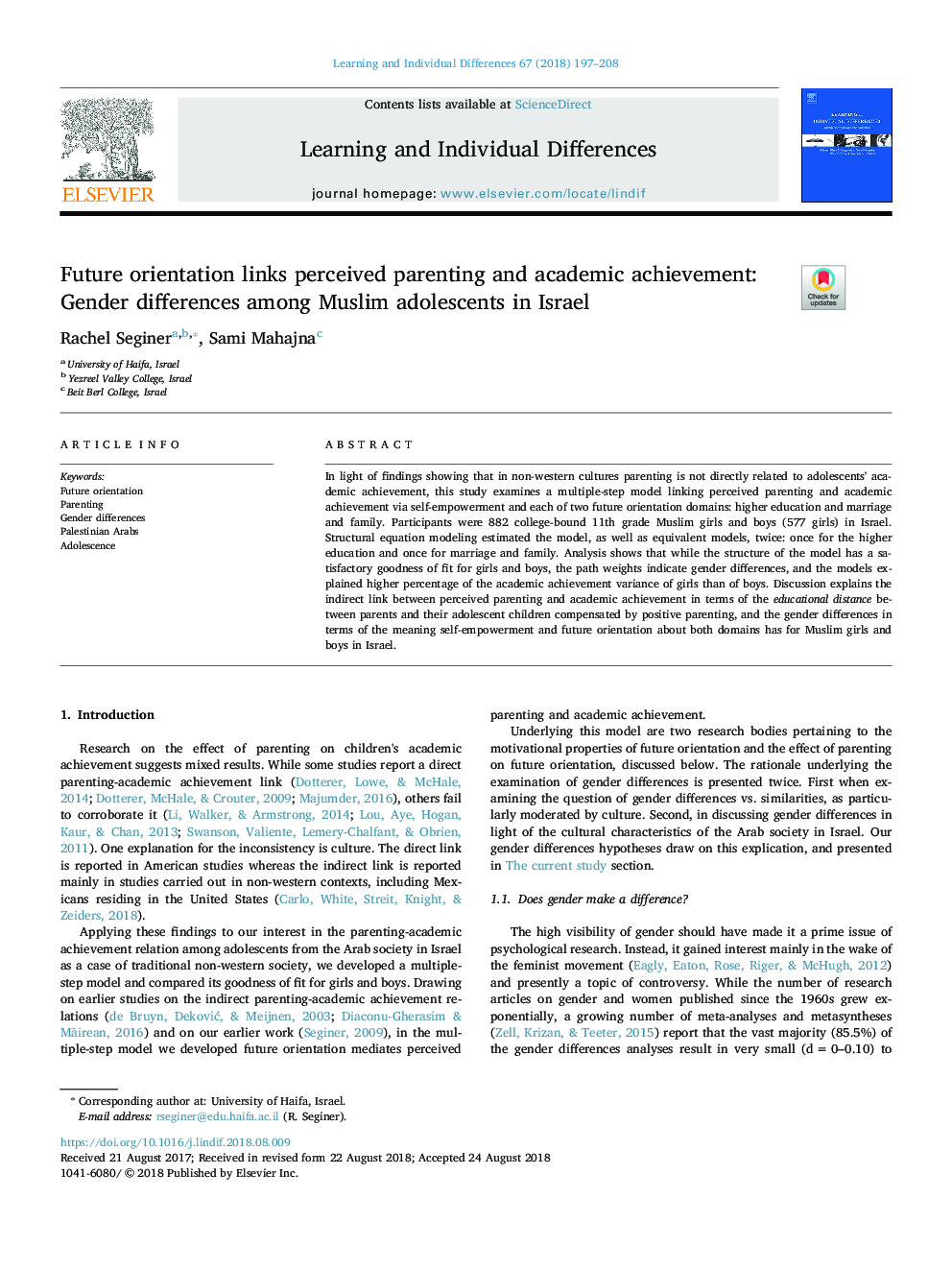| کد مقاله | کد نشریه | سال انتشار | مقاله انگلیسی | نسخه تمام متن |
|---|---|---|---|---|
| 11002163 | 1436357 | 2018 | 12 صفحه PDF | دانلود رایگان |
عنوان انگلیسی مقاله ISI
Future orientation links perceived parenting and academic achievement: Gender differences among Muslim adolescents in Israel
ترجمه فارسی عنوان
جهت گیری های آینده پیوند های درک شده والدین و پیشرفت تحصیلی: تفاوت های جنسیتی در نوجوانان مسلمان در اسرائیل
دانلود مقاله + سفارش ترجمه
دانلود مقاله ISI انگلیسی
رایگان برای ایرانیان
کلمات کلیدی
جهت گیری آینده، والدین، تفاوت های جنسیتی، اعراب فلسطینی، بلوغ،
ترجمه چکیده
با توجه به یافته های نشان می دهد که در فرهنگ غربی غربی، والدین به طور مستقیم به پیشرفت تحصیلی نوجوانان وابسته نیستند، این مطالعه یک مدل چند مرحله ای است که بین والدین درک شده و پیشرفت تحصیلی را از طریق توانمند سازی خود و هر یک از دو حوزه ی جهت گیری آینده، مورد بررسی قرار می دهد: و ازدواج و خانواده. شرکت کنندگان 882 دختر و پسر مذهبی 11 ساله مسلمان (577 دختر) در اسرائیل بودند. مدل سازی معادلات ساختاری مدل و همچنین مدل معادل آن دو بار برای یک دوره آموزش عالی و یکبار برای ازدواج و خانواده تخمین زده شده است. تجزیه و تحلیل نشان می دهد که در حالی که ساختار مدل دارای رضایت بخش مناسب برای دختران و پسران است، وزن مسیر تفاوت های جنسیتی را نشان می دهد و مدل ها درصد بیشتری از واریانس موفقیت تحصیلی دختران نسبت به پسران را بیان می کنند. بحث بحث ارتباط غیر مستقیم بین والدین درک شده و پیشرفت تحصیلی را از لحاظ فاصله تحصیلی والدین و فرزندان نوجوان آنها جبران می کند که از طریق والدین مثبت جبران می شود و تفاوت های جنسیتی از لحاظ معناداری خودمختاری و جهت گیری های آینده در هر دو حوزه برای دختران مسلمان توضیح می دهد و پسران در اسرائیل.
موضوعات مرتبط
علوم انسانی و اجتماعی
روانشناسی
روانشناسی رشد و آموزشی
چکیده انگلیسی
In light of findings showing that in non-western cultures parenting is not directly related to adolescents' academic achievement, this study examines a multiple-step model linking perceived parenting and academic achievement via self-empowerment and each of two future orientation domains: higher education and marriage and family. Participants were 882 college-bound 11th grade Muslim girls and boys (577 girls) in Israel. Structural equation modeling estimated the model, as well as equivalent models, twice: once for the higher education and once for marriage and family. Analysis shows that while the structure of the model has a satisfactory goodness of fit for girls and boys, the path weights indicate gender differences, and the models explained higher percentage of the academic achievement variance of girls than of boys. Discussion explains the indirect link between perceived parenting and academic achievement in terms of the educational distance between parents and their adolescent children compensated by positive parenting, and the gender differences in terms of the meaning self-empowerment and future orientation about both domains has for Muslim girls and boys in Israel.
ناشر
Database: Elsevier - ScienceDirect (ساینس دایرکت)
Journal: Learning and Individual Differences - Volume 67, October 2018, Pages 197-208
Journal: Learning and Individual Differences - Volume 67, October 2018, Pages 197-208
نویسندگان
Rachel Seginer, Sami Mahajna,
